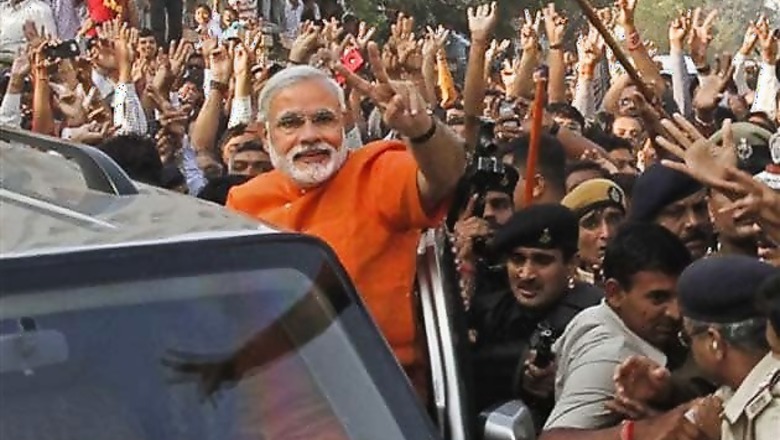
views
Here is a look at the rise of Gujarat Chief Minister and Bharatiya Janata Party (BJP) leader Narendra Modi and his political career since 1987.
September 17, 1950
Narendra Damodardas Modi is born in the ancient city of Vadnagar in present-day Gujarat state into a middle-class Hindu family. As a child, he runs away from home and heads to north India, living with sadhus - or holy men - for months before returning to Gujarat in the late 1960s to serve steaming cups of tea alongside one of his brothers at a stall in Ahmedabad.
1987
Modi joins the Bharatiya Janata Party (BJP) as the seven-year-old party becomes more popular and taps into the growth of Hindu nationalism across India. The party wins a majority in Gujarat in 1995 and Modi rises quickly up the ranks.
2001
Modi gets his big break when Keshubhai Patel, the former chief minister of Gujarat, is forced to step down in the fallout from the January earthquake that killed around 20,000 people. He is selected as Patel's replacement and remained in power ever since, becoming Gujarat's longest-serving chief minister.
February 27, 2002
Riots break out after over 50 Hindu pilgrims die in a train fire in the town of Godhra. Between 1,000 to 2,000 people, mostly Muslims, are killed, and Modi, as Chief Minister, is accused by his critics of not doing enough to stem the riots and even quietly encouraging them - allegations he has strongly denied and which have never been proved. To this day, the riots haunt Modi's government. In 2012, one of Modi's former ministers, Maya Kodnani, is sentenced to 28 years in jail alongside 30 others for the violence.
2005
Modi is denied a visa to travel to the United States for alleged violation of religious freedom, causing uproar in India. Modi describes the denial of a diplomatic visa and revoking of a business visa as insulting and asks the government in New Delhi to take up the issue with US officials.
October 2008
Modi persuades Tata Motors to move its factory to build its ultra-low cost Nano car to Gujarat from West Bengal after protests from farmers over land compensation, a sign of his business-friendly approach to politics. Gujarat today is one of India's wealthiest states and Modi's supporters credit him for bringing uninterrupted power supplies, smooth roads and a flood of investment to the state.
August 31, 2012
Modi addresses a number of topics during an online web cam chat which draws questions from around India and across the world. Viewed as a media-savvy politician, the 62-year-old is also an avid Twitter user with more than a million followers.
October 22, 2012
British High Commissioner James Bevan sits down with Modi to discuss business and investment in a landmark meeting that ends the UK's 10-year diplomatic boycott imposed on him for failing to stop the Gujarat riots.
December 13, 2012
Modi seeks to win a fourth term as Chief Minister of Gujarat. Results from the two-stage vote will be published on December 20. For the first time during campaigning in India, Modi uses 3-D projections of himself to appear "live" on stage at simultaneous events. Opinion polls indicate Modi will cruise to another victory.


















Comments
0 comment